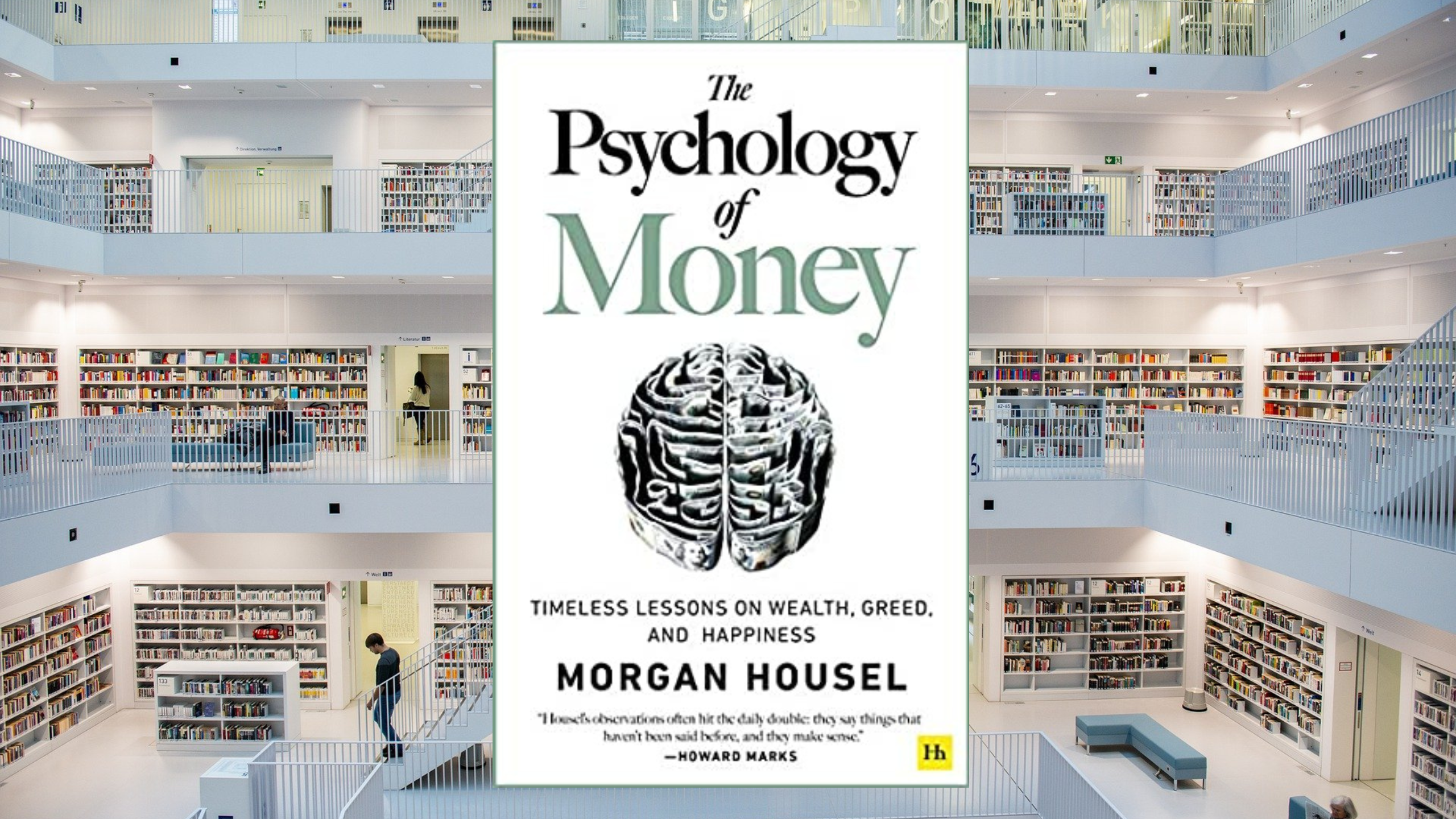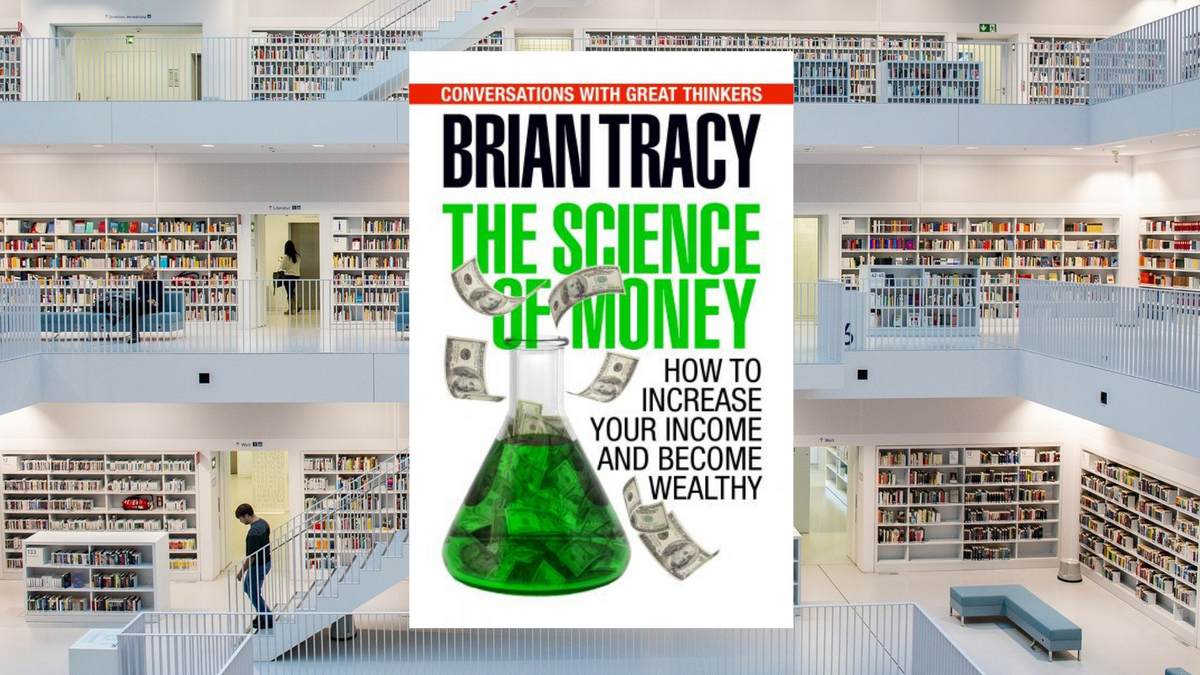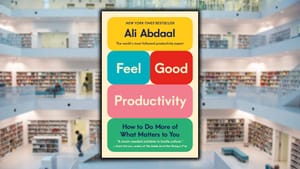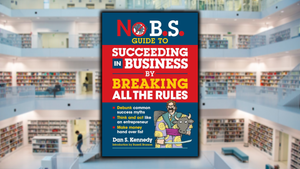
This Book is For:
*Anyone who wants to become more financially literate and learn the basics of money, without becoming confused by overcomplicated explanations and harmful misinformation.
*Business owners who want to deepen their knowledge of the fundamentals of value exchange and commerce, and who want to expand the profitability of their business ventures using tried and true strategies for wealth creation.
*People who have been struggling for a while to crack the "money code," and who want to finally get ahead of their situation and learn what they need to know to start working toward financial freedom.
*Parents and teachers who want a simple yet valuable way to explain the realities of finance and money to their students, and who want a sample "curriculum" they can use to teach young people essential money skills that will serve them well for a lifetime.
Summary:
“Successful people are always looking for opportunities to help others.
Unsuccessful people are always asking, 'What's in it for me?'”
-Brian Tracy
You can get virtually anything you want in life, just as long as you help enough other people get what they want.
That's one of the earliest lessons I learned from one of the first self-improvement books I've ever read, and Brian Tracy has been a staple of my wide reading ever since. The truth of his principles has been proven time and time again, and in my own life, much of my success can be directly attributed to what I've learned from him.
In this book, The Science of Money, Brian breaks down some of the myths and misconceptions concerning how money works and how to bring more of it into your life, as well as provides enlightening explanations of the ideas that will help you create wealth. Perhaps "science" is too strong a word - there's certainly a softer, more human element to wealth creation, too - but these ideas are solid.
Importantly, the ideas in this book are foundational. They will help you to start your journey to riches on the right foot.
There's a ton of misinformation, bad advice, and downright lies that are propagated today when it comes to making money, but you'll find none of them here. And even if you're a little further along on your journey, you'll find that this book is an excellent refresher and one that you may want to keep close by.
The larger point is that you and I don't have to be confused or disoriented when it comes to money. The topic of money - how to create it, invest it, and spend it wisely - has been the subject of intense research and debate, and the basic outline of a "science" of money - insofar as this is possible - has already been laid out. The most important things you need to know are covered in this book.
You don't have to run or hide from the topic of money any longer. You don't have to remain stuck.
In my own life, the discovery of Brian Tracy's books and ideas was nothing short of revelatory. Like I said, I owe a large part of my eventual success to him. Veterans of the self-improvement genre will have heard many of these ideas before, but to a young kid encountering these concepts for the very first time, it was absolutely life-changing.
And these are not complicated ideas to understand! They're even too simple, and too sugary for people to take their time with. Quotes like these come to mind:
"The only direction you can coast is downhill."
Or this one:
"There are no traffic jams on the extra mile."
Many people would skim through those and think, "I already know that! There's nothing new here!" But that would be a mistake. If you actually live these ideas - if, for example, you actually start doing more than that for which you are paid - then you will quickly enough find yourself getting paid a lot more.
That, in essence, is the Law of Cause and Effect. If wealth is the "effect" you want to create in your life, you need to repeat the "causes."
Of course, there are a great many more ideas contained here in this breakdown, such as the vital importance of investing in yourself, a discussion about identifying infinite opportunities, and advice about how to increase your earning capacity, but I will say this: if you bring these ideas to your life through your daily actions and activities, your financial life will change for the better. It will improve.
The world is getting richer all the time; the principles of wealth creation are known; you are more capable than you know, and Brian Tracy's hard-won wisdom is available to all who seek it at the foot of the Stairway to Wisdom.

Key Ideas:
#1: Your Single Most Valuable Financial Asset
“Your most valuable financial asset is your earning ability. What is your earning ability? It’s your ability to get results that people will pay you for, and the most important word for success, in life and in business, is results.”
In life and in business, you are paid in proportion to the value you create for society. Your worth as an individual human being is infinite, but your value to society is what will make you rich.
An author who understands this extremely well is MJ DeMarco who, in The Great Rat Race Escape, explains that "follow your passion" is often terrible advice. Brian Tracy would agree, although it's a wonderful thing when what you're good at, what you enjoy doing, and what society values, all align at once.
If your "passion" is to pain Faberge eggs with pictures of Lionel Messi on them, you're probably never going to get rich trying to make a career out of that. Your Total Addressable Market (or, TAM) is just too small, and the price that most people would be willing to pay just won't be high enough to allow you to paint eggs full-time.
Luckily, however, there are ways to increase your earning ability that doesn't involve wishing or hoping. You can develop marketable skills - things you can do or provide that society values and will pay you for - and deploy them in such a way that you will increase your income, sometimes quickly and dramatically.
For example, the profession of sales is one of the highest-earning professions in the world because there's virtually no limit to how much money salespeople can make. It all depends on what they're selling, to whom, and how good they are at selling it.
There's not a single successful business anywhere that has ever survived with zero sales, and if you can develop the marketable skill of sales to an extremely high level, then no company in their right mind would ever let you go. You'd be too valuable to them. You'd be making them too much money, and, by extension, you'd be earning much more as well.
Of course, you don't have to go into sales in order to increase your earning ability, but it's certainly one viable option. There are other ways to increase your earning ability as well, either directly or indirectly. One is by being personable and improving your attitude.
People want to work with (and buy from) people whom they like and trust, and if you become likable and reliable, then eventually, your reputation will compound and you will increase your earning ability. Just showing up to work in a positive frame of mind, with a willingness to expend your best effort, and an intention to make your co-workers' lives as easy as possible will go a long way. In the right environment, it will not go unnoticed.
Another way to increase your earning ability is to develop specialized knowledge; in other words, become extremely good at something that only a few, select people can do. If just anybody can do what you do, they're going to hire anybody, and not you. As Naval Ravikant says, if society can train you, it can train somebody to replace you.
Specialized knowledge can include things like creativity and expertise. For example, maybe you're very good at science, you're very funny and relatable, and you're very good at explaining difficult concepts to non-experts. You can use that to help people who are not so good at any or all of those three things, and you can get paid extremely well to help them bridge the gap between those skills.
You may have also heard that "your network is your net worth," and to a large degree, this is true as well. I always say that you can get virtually anything you want in life as long as you help enough other people get what they want.
If you develop marketable skills, work on perfecting them each and every day, and then go out looking for people you can help, then in time, you're going to build a very powerful network.
Everybody wants to be rich, happy, and healthy, and if you can help people do that, then you will be welcome wherever you go. If your focus is on increasing the value of your contribution, then your own value will rise as well.
#2: Investing in Yourself = 100% of the Return
“If you invest in yourself, you own 100% of the investment forever. You get 100% of the return.”
There are very few sure things in life, but the value of investing in yourself is one of them. There are so many investments that we are not in control of - whether you invest in individual companies, the stock market, etc., - but if you invest in yourself, you are entitled to 100% of the upside.
Not only that, but if you're constantly upgrading your skills and abilities, you'll never be at the mercy of market forces that determine others' economic worth, and you'll basically be able to "give yourself a raise" almost every day. They will be "commodities," but you will be a recognized expert. You will stand out where everybody else just blends in. So, given the chance, always place big bets on yourself.
When you invest in yourself - in your education, your health, your relationships, etc. - you own that investment forever and for all time. Everything comes back to you.
The thing is, though, that because you're in direct control of your level of investment in yourself, no one else is going to do it for you. It's not going to just "happen" - you have to be intentional about it. You need a plan, a strategy.
One of my business mentors, Alex Hormozi, refers to your personal investment portfolio as the S&ME 500 (as opposed to the S&P 500), and he explains why, especially when you're young, it makes much more sense to invest in your future earning ability, than it does to invest in some index fund or other that's going to give you like an 8% return on the little bit of cash you have saved up already.
Why invest $500 in the stock market and (maybe, hopefully) earn an 8% return on that amount, when you can invest that same $500 in yourself by buying, say, 30 great business books, an online course about starting your first business, and a yearly membership to the Stairway to Wisdom?
You're going to earn pennies on the dollar by investing in the stock market (at least in the short term, and with tiny dollar amounts), but your earning ability will multiply by leaps and bounds by investing in yourself, developing marketable skills, building specialized knowledge, and taking action in the real world.
#3: Teach Once, Learn Twice
“You become what you think about most of the time. You also become what you teach most of the time. So if you start to teach these principles to someone else, you start to internalize them at a deeper level.”
This section was really easy for me to write. Not because I'm some super billionaire business mogul, but because I've been reading hundreds of books about money over the past few years, I've watched hundreds of hours of CEO interviews and high-quality YouTube videos and podcasts about money, business, and wealth creation, and for years I've been teaching what I've learned to others.
I've internalized this information from being exposed to it for so long and from taking so much action on what I've learned, that I can now sit here, secure in the knowledge that this stuff works, and that you'll be able to use it to create wonderful outcomes in your own life as well.
See, when you teach something, you get to learn it twice. That's because in order to be a good teacher, you first have to understand it yourself, and then be able to synthesize that knowledge and put it into a form that your readers, listeners, and students will understand and be able to apply.
Teaching what you know solidifies your own understanding, and if you can't explain it to someone else, you don't really understand it.
Brian Tracy's larger point is right there in the first sentence of the quote above, too. If you think about something all the time, you become that. You internalize your thoughts and actions over a long period of time and it eventually becomes your identity.
#4: Infinite Opportunity
“As long as there are human wants unfulfilled and human problems unsolved and human needs that have not been taken care of, there will always be opportunities for the creative minority.”
If you say that you can't find a good business idea, or that you can't find any new way that you could be helpful or valuable to those around you in ways that they would pay you for, what you're really saying is that the world is perfect and needs nothing.
Man, I thought I was an optimist!
Problems exist everywhere in human life, all over the globe, and if you are a person capable of solving them, then you will be paid well for this.
So, look for problems you can solve - or can gain the skills to solve - and get after it! That's how you're going to increase your income and your wealth, sometimes exponentially.
People everywhere at all times and in all places want to be happy, healthy, and rich (the three core desires), and as long as there are people out there lacking in any of those areas, you will have opportunities to make money.
It's also helpful to remember that most people don't have all three of these areas handled at once. There are plenty of out-of-shape rich people who are willing to pay for a physical transformation, and there are plenty of happy and healthy people who would love to learn how to make more money.
There are now 8,000,000,000 human beings alive on this planet, and a huge number of them have access to the internet. However, billions of people still don't have access to the internet, and when they do, they are going to enter your addressable market as well. They are going to have problems that you can solve, for a profit.
We are living in the internet gold rush, and now is the time to start looking for interesting problems to solve and making yourself irreplaceable. Build your reputation now for being able to solve the problems that most people would pay to have solved.
You don't have to restrict yourself to the three core desires, either! There are billionaires in the waste management industry, to give just one example of a "boring" industry that hardly anyone would describe as their "passion." However, it's still an important problem that everyone needs solved, and those people were willing to step up and solve it, making themselves billionaires in the process.
The big takeaway here is to recognize the importance of identifying profitable opportunities first, and then developing the skills necessary to thrive in the industries that relate to them. Go out in search of people you can help, and then get busy helping them. It's great business advice, and it's great advice for the rest of your life too!
#5: Timing Your Financial Strike Perfectly
“What is the amount that you need to reach in assets and cash flow, monthly and annually, so that you can stop? Self-made millionaires spend a good deal of time thinking about the answer to this question: how much will I need in order to be able to support the lifestyle I desire, and what will I do then?
Then they focus on that, and they sacrifice a lot in the short term in order to finally accumulate that amount of net worth, yielding that amount of income, so that they are free, their family is free, their children are free.
They’re not going to stop working, but that’s the crossover point. At that point they can get involved in philanthropy and in other activities and cut back. But for the first part of your life, you must put your whole heart into becoming financially free, and you must do it when you have the highest amount of energy, drive, ambition, and opportunity.”
Time moves only in one direction, and if we don't use what time we have available to free ourselves, it will be gone and never return.
As the investor Bill Perkins says in his excellent book, Die with Zero:
“Think about the three basics people need to have to get the most out of life: health, free time, and money. The problem is that these things rarely all come together at once. Young people tend to have abundant health and a good deal of free time, but they don’t usually have a lot of money.”
Maximizing those three resources - time, money, and health - is how you maximize your life. Perkins is right, in that they don't usually arrive all at once, and what Brian Tracy is saying is that sometimes it makes sense to sacrifice quite a lot of one or two of them at the beginning of your life to set yourself up later.
Naturally, it all depends on which season of life you're in. If you're 90 years old with millions in the bank and next-to-zero expenses, it makes absolutely no sense to sacrifice more of your time and health to amass more cash.
One of the things you need to be thinking about as a younger person, however, is how much money you need coming in - and how much you'd like to earn passively with your investments - and about doing everything you can to get that handled as optimally as possible.
When you're young, you have virtually boundless energy. And, as the poet William Blake so beautifully stated, "Energy is eternal delight."
Odds are, you have the time and the energy available now to devote at least some of it to the exciting project of getting rich and setting yourself up for a fantastic financial future. In my opinion, this is a much better idea than blazing through all your cash in your thirties and forties and then waking up wondering where it all went.
It's all about balance. This is the youngest you'll ever be, and there are so many things you can do now that you'll never be able to do again.
When most people get older, they start families, take on additional commitments, and get involved in their communities. That's all great, but it also means you won't be able to load up your twenty-year-old car on a whim and hit the open road with three of your closest friends for an unforgettable vacation. You won't be able to say, "Hey, why not? I'll be there!" when someone suggests a random adventure. You'll have car payments and parent-teacher meetings.
So, again, it's a balance. But it usually makes sense to sacrifice at least a little bit of your time (and even your health, by staying up late working on your business, for example) in order to come out ahead later on.
Just remember that wheelchairs don't fit inside the trunk of Lamborghinis.
#6: Assemble a Team of Mentors
“So if you want to double your income, find somebody who is earning twice as much as you in your own field. Then trace it back to what they did to get there. You find that everybody who’s earning twice as much as you today was at one time earning half as much. So they must have done specific things. If you ask them, they’ll tell you.
If you don’t know them personally, read their books and their articles and their interviews, and they will tell you, because people who earn a lot of money are very generous in telling other people how they did it. If you do what other successful people have done over and over again, you get the same result, based on the law of cause and effect.”
You should only take advice from people who are already where you want to be in life, and ideally, from people who got there by following their own advice.
The great thing, however, is that most people want to help others succeed, and this goes especially for people who have already achieved some degree of success in life. Successful people want to help you succeed as well, but you have to ask them. And then, just as importantly, you have to actually follow through on what they tell you.
Think of it almost like a homework assignment. Rich, financially successful people will tell you how they did it, but they're not going to hold your hand, and they're not going to waste their time trying to teach somebody who's never going to take action on what they learn.
So, the help you receive from people who are ahead of you is often conditional on you actually following through. You have to show them that you're willing to put in the work, that you're willing to listen and learn, and that you're now ready for the next assignment.
In-person mentors are great, of course, and masterminds are often a fantastic way of accelerating your progress by association with an ambitious, active group of like-minded, success-minded people.
But I've also had thousands of mentors in my life associate with me in the form of books, and people I follow online - hell, some of my mentors are even dead!
Anytime I want, I can consult the beautiful wisdom of Simone Weil, the tough gentleness of Marcus Aurelius, or the cosmic perspective of Alan Watts, even though I am separated from all these individuals by varying degrees of time and distance. We can never meet in person, but they're with me, and with their advice and mentorship, I am stacking the probabilities in my favor.
You can do the same. You can seek out mentors across time and space, and you can develop relationships with the most brilliant, effective, and generous minds that have ever blessed creation.

Book Notes:
“The wonderful thing is that human beings are uniquely designed, in our DNA, so that our greatest joy comes from serving other people.”
“Money is a way of measuring whether or not you’re actually serving people.”
“Do what you have to do as quickly as you can so you can do what you want to do for as long as you can.”
-Jim Rohn
“The value of a thing is only what somebody is willing to pay for it.”
“You’ll always be paid in direct proportion to what you do, how well you do it, and the ease or difficulty of replacing you.”
“The one secret to success is to work all the time you work. Start earlier, work harder, stay later, and work the whole darned time.
Don’t mess around. Don’t chat with your friends. Don’t go out for lunch or coffee or read the paper or surf the internet. When you come to work, work. Put your head down full blast and work.
You can also work more creatively, or you can do anything that enables you to get greater leverage and results from your efforts. Some people produce five times as much as other people in the same eight hours a day.”
“You can’t place an objective value on your own labor, protesting and demanding increases and so on. It’s only what other people are willing to pay for your labor in a competitive market that determines what you earn and what you are worth on financial terms.”
“Use zero-base thinking. Always ask when you have new information, ‘If I had not already purchased this stock or investment, knowing what I now know, would I purchase it again today?’”
“The average person today works a forty-hour week, but according to the labor studies, during that week he or she only works thirty-two hours. Why? It’s because they take coffee breaks and lunches and start later and stop earlier.
In those thirty-two hours, they waste 50% of that time, mostly with idle chitchat, Facebook, social media, internet, phoning friends, and so on. So the average person is only doing sixteen hours of productive work each week and in that time they do work of low value.
Then they don’t understand why they don’t get paid more money.”
“The fastest way to get a raise is to do your job so well that your employer will pay you to make sure you don’t go somewhere else, where some other employer will pay you more. That’s just the way supply and demand works.”
“Millions and millions of people have started from nothing to become millionaires by doing certain things in a certain way. If only one person had become a millionaire, then you could say that was a rare accident. With two, you could say it’s a coincidence. But if millions and millions of people from every single background with every limitation that you could imagine become millionaires, then there are obviously some laws and principles at work.”
“Successful people make a habit of doing what unsuccessful people don’t like to do.”
“You can only tell what your beliefs are by looking at what you do. Especially what you do when you have a choice.”
“Money is not divided, but rather created.”
“People are always upward, and this really is a healthy thing. I call it divine discontent. You strive. Psychologists have found that your level of happiness or satisfaction is directly proportionate to where you are relative to where you thought you should be, or expected to be, at this stage of your life.”
“Most of modern politics depends upon the economic ignorance of the populace.”
“All politicians get into office by promising to give free money to other people – Santa Claus. Just watch: every election somebody is running as Santa Claus.”
“Government is basically a dead weight on the society. Government produces nothing of value that people want, because if people wanted it, the private sector would produce it.”
“Knowledge is the real source of competitive advantage today.”

Important Insights from Related Books:

The Psychology of Money, by Morgan Housel:
Doing well with money has a little to do with how smart you are and a lot to do with how you behave. Exploring exactly how this plays out in real life is Morgan Housel's project here, and in this book, he covers 20 of the most important logical flaws, biases, and causes of bad behavior that do the most to make the world of money such a circus.
One of his greatest observations is that knowing what to do tells you nothing about what happens in your head when you actually try to do it, and he also explains why people make decisions with money that may seem crazy to us but actually make perfect sense to them. No one is crazy, says Housel, it's just that we've each learned different lessons about money depending on our worldview, how we were brought up, and the individual experiences we've had.
In this breakdown, we're going to be looking at why gaining control over your time is one of the highest dividends money can pay, and the parts that luck and risk play in the formation of our strategies for life.
We're also going to be working on making you "antifragile" by making sure you eliminate any single points of failure that currently exist in your life, and I'm going to be introducing you to one of the most effective investment strategies ever devised, otherwise called "Shut Up and Wait."
Sample Quotes from the Book:
“People from different generations, raised by different parents who earned different incomes and held different values, in different parts of the world, born into different economies, experiencing different job markets with different incentives and different degrees of luck, learn very different lessons."
“None of the 2,000 books picking apart Buffet's success are titled This Guy Has Been Investing Consistently for Three-Quarters of a Century. But we know that's the key to the majority of his success. It's just hard to wrap your head around that math because it's not intuitive. There are books on economic cycles, trading strategies, and sector bets. But the most powerful and important book should be called Shut Up and Wait. It's just one page with a long-term chart of economic growth."
“Money’s greatest intrinsic value - and this can't be overstated - is its ability to give you control over your time. To obtain, bit by bit, a level of independence and autonomy that comes from unspent assets that give you greater control over what you can do and when you can do it."
Read the Full Breakdown: The Psychology of Money, by Morgan Housel

The Almanack of Naval Ravikant, by Eric Jorgenson:
Being rich and happy are learnable skills. As in certain propositions in physics, starting conditions are very important, but one of the greatest lessons you'll learn from reading books like this one is that where you start off doesn't have to be where you end up. If there's a skill you lack, you can learn it; if there's a big scary problem looming over you, you can overcome it; if you want more out of life, you can have it.
But, there are traps along the way. These traps can take the form of pessimism and self-defeating behaviors; the creeping expansion of desire; bad advice from well-meaning people; and a lot more that The Almanack of Naval Ravikant can help you avoid.
Naval is the founder of AngelList, a website that allows startups to raise money from angel investors free of charge, and he's had over 70 successful exits himself, after investing in companies like Uber and Twitter before almost anyone else.
He's become somewhat of an entrepreneurship/start-up culture icon, and this book is a collection of his greatest wisdom distilled from a decade of podcast appearances and thousands of tweets. After a lifetime of study and application of philosophy, economics, and wealth creation, Naval has proven the impact of his principles, and they're all laid out here in this book.
Sample Quotes from the Book:
“What making money will do is solve your money problems. It will remove a set of things that could get in the way of being happy, but it is not going to make you happy. I know many very wealthy people who are unhappy.
Most of the time, the person you have to become to make money is a high-anxiety, high-stress, hard-working, competitive person.
When you have done that for twenty, thirty, forty, fifty years, and you suddenly make money, you can't turn it off. You've trained yourself to be a high-anxiety person. Then, you have to learn how to be happy."
“Specific knowledge is knowledge you cannot be trained for. If society can train you, it can train someone else and replace you.”
"If you're a perpetual learning machine, you will never be out of options for how to make money. You can always see what's coming up in society, what the value is, where the demand is, and you can learn to come up to speed."
Read the Full Breakdown: The Almanack of Naval Ravikant, by Eric Jorgenson

The Education of Millionaires, by Michael Ellsberg:
Just because some of the smartest and most successful individuals in the world dropped out of college or skipped college altogether, does that mean that you should too?
Not necessarily; but in this book, author Michael Ellsberg makes the case that most of what you'll need to learn in order to become successful - by anyone's standards - are skills that you'll never see taught in school.
Teaching any of those success skills would require dozens of books for each one, and Ellsberg doesn't claim to teach you everything you need to know on these pages. But he tells you where to start looking, and what's important to look for.
He doesn't just give you a fish, or even go too deep in teaching you how to fish; he simply explains why you absolutely have to learn to fish, and where to go in order to learn most effectively.
Not only that, but if you're missing any of these critical success skills, you're handicapping yourself horribly and holding yourself back from all that you could achieve and become.
Sample Quotes from the Book:
“The driving theme of the stories in this book is that, even though you may learn many wonderful things in college, your success and happiness in life will have little to do with what you study there or the letters after your name once you graduate.
It has to do with your drive, your initiative, your persistence, your ability to make a contribution to other people’s lives, your ability to come up with good ideas and pitch them to others effectively, your charisma, your ability to navigate gracefully through social and business networks (what some researchers call ‘practical intelligence’), and a total, unwavering belief in your own eventual triumph, throughout all the ups and downs, no matter what the naysayers tell you.
While you may learn many valuable things in college, you won’t learn these things there – yet they are crucial for your success in business and in life. Whether you’re a high school dropout or a graduate of Harvard Law School, you must learn and develop these skills, attitudes, and habits if you want to excel at what you do.
In this new economy, the biggest factor in your success will not be abstract, academic learning but whether you develop the real-life success skills evinced by the people on these pages, and how early you do.”
“I am passionately pro-education. There are few things I care more about than reading and learning constantly. Yet, the lives of the people profiled in this book show conclusively that education is most certainly not the same thing as academic excellence. We’ve conflated them, at great cost to ourselves, our children, our economy, and our culture.”
“The key to making money, and therefore living a life of less stress, is to cause someone to joyfully give you money in exchange for something that they perceive to be of greater value than the money they gave you.”
Read the Full Breakdown: The Education of Millionaires, by Michael Ellsberg

The 10 Pillars of Wealth, by Alex Becker:
Most people aren't wealthy. They may or may not be struggling financially, but the average person will never become rich, and this is because it's literally impossible both to remain average and make above-average money at the same time.
You must elevate your financial game if you wish to become wealthy, and that process starts with embracing the mindsets and thinking patterns of the world's wealthiest people.
Now, obviously, there's a huge difference between a person's value to society and their value to humanity itself.
Each and every individual's value to humanity is literally infinite - there are no "extra" people on this planet. But your value to society is what directly affects what you get paid, and the amount of wealth you can accrue in your lifetime.
If you want to be rich, you must make yourself exceptionally valuable to society.
Sample Quotes from the Book:
"By wanting to become wealthy, you are also saying that you want to accept the challenge to be better at making money than 99 percent of the people on this planet. Just by attempting this, you are going to have to accept the fact that you must not just be good, you must be incredible."
“People rarely become successful if they are comfortable in their current situation.”
“If you decide to follow through no matter what and never give up, becoming rich will not be a matter of if, if it will be a matter of when.”
Read the Full Breakdown: The 10 Pillars of Wealth, by Alex Becker

The View from the Opposition:
No one's ideas are beyond questioning. In this section, I argue the case for the opposition and raise some points you might wish to evaluate for yourself while reading this book.
#1: The Harvard Study That Didn't Exist
So there's some controversy that has dogged Brian Tracy for a few years now, and it's this: in one of his earlier books, he quoted a research study that didn't...um...exist.
Like, at all. It never happened, but Tracy referenced the "results" of the study in his book as though it was indisputable fact.
The details change depending on the telling, but in 1979 at Harvard Business School - or 1953 at Yale - "they" did a study on goal-setting.
Apparently, only 3% of the class had ever come up with clear, written goals, and apparently, after twenty years or so, follow-up research revealed that the 3% with clear, written goals were earning 10 times as much money as the other 97% with no clear, written goals.
Pretty cool, right?
Except that, yea, no such study was ever conducted. Harvard and Yale both say it never happened. No student from either school remembers it. And yet this detailed story appeared in one of Brian Tracy's books!
This is what Harvard had to say about the whole thing:
"It has been determined that no “goals study” of the Class of 1953 actually occurred. In recent years, we have received a number of requests for information on a reported study based on a survey administered to the Class of 1953 in their senior year and a follow-up study conducted ten years later. This study has been described as how one’s goals at graduation related to success and annual incomes achieved during the period.
The secretary of the Class of 1953, who had served in that capacity for many years, did not know of [the study], nor did any of the fellow class members he questioned. In addition, a number of Yale administrators were consulted and the records of various offices were examined in an effort to document the reported study. There was no relevant record, nor did anyone recall the purported study of the Class of 1953, or any other class."
So, where do we go from here? Do we throw out everything that Brian Tracy has ever written about goal-setting and achievement?
I don't think so, and here's why.
While I don't think that "it was a long time ago" is a proper defense - or at least a complete defense - there does come a point when you just have to realize that someone made a mistake, they were wrong, they were outed for it...and then we have to move on.
The book in question, Goals!, came out in 2003. Since then, Brian Tracy has been one of the leading figures in the sales and self-improvement category, writing and producing content that has legitimately changed the lives of millions of people. That's not nothing, although, of course, he should have been much more careful when writing his previous book.
The whole thing also doesn't take away from the fact that it's excellent advice to write down your goals and targets. I do it every single month/year, as do a multitude of other highly successful people who swear by the practice. Of course, we could all be wrong, but I don't think so.
You can't hit a target you can't see, and having clear, written goals focuses your mind on the day ahead - and on the task in front of you - in an exceptionally valuable way.
Having a clear, definite purpose that excites you and calls you forward - urging you to give your absolute best effort in life - is a wonderful thing, and you don't need a degree from Harvard or Yale to tell you that.
"The test of a first-rate intelligence is the ability to hold two opposed ideas in the mind at the same time and still retain the ability to function.”
-F. Scott Fitzgerald

Questions to Stimulate Your Thinking:
The quality of your questions determines the quality of your life. That's also how you get the absolute most out of any book that you decide to read:
You ask great questions the whole time - as though the book was on trial for its life.
Here in this section are a few questions that can help guide and stimulate your thinking, but try to come up with your own additional questions, especially if you decide to read this book the whole way through...
#1: "What would you do with your life if you knew that you couldn't fail?"
#2: "Which of life's three most essential resources - time, health, and money - do you have the most of right now? Which could you sacrifice some of right now in order to gain a disproportionate amount of some other important resource later?"
#3: "Whom do you serve? Whose lives are you making better with the work that you do? Can you increase the level of service that you provide? Can you increase your overall value to others and to society at large?"
#4: "In your profession, who are the people that are generating the greatest results and succeeding the most? What can you learn from them? Can you ask them for their advice personally or read their books to find out their secrets?"
#5: “What have you done today to increase your earning ability, to increase the quality and quantity of results that you can get for people who are willing to pay you for that increase?"
#6: "What can you do today (or this month, this year, etc.) that would be of greatest value to your employer, and that would enable you to earn more money?"
#7: "Where did you pick up your previous beliefs about money? Did you learn about money from people who were more successful than you? Or did you pick up negative, limiting beliefs from people who didn't know what they were talking about?"
#8: "What is the largest financial investment you've ever made in yourself and your future? Is it paying off? How can you watch that investment more carefully to ensure that it does pay off handsomely in the future?"
#9: "What is it all for? What are the ultimate aims you're looking to achieve - that money could help you accomplish or realize - and why are they important to you? Do you know how much money or time it will take to achieve them?"
#10: “When will you know when you have enough money, and what will you do then?”
"Judge a man by his questions, rather than by his answers."
-Voltaire

Action Steps:
So you've finished reading. What do you do now?
Reading for pleasure is great, and I wholeheartedly support it. However, I am intensely practical when I'm reading for a particular purpose. I want a result. I want to take what I've learned and apply it to my one and only life to make it better!
Because that's really what the Great Books all say. They all say: "You must change your life!" So here, below, are some suggestions for how you can apply the wisdom found in this breakdown to improve your actual life.
Please commit to taking massive action on this immediately! Acting on what you've learned here today will also help you solidify it in your long-term memory. So there's a double benefit! Let's begin...
#1: Come Up with 10 Ways to Increase Your Earning Ability
The age we're living in has created numerous ways for all of us to increase our earning abilities - we just need to get a little creative. That said, there are a few areas where advanced skills will probably always be in high demand.
Sales is one such area, and if you learn how to sell, what you'll really have learned is how to make yourself indispensable. Salespeople are always the last to go in any organization, especially since without sales, no company can ever succeed.
Become great at selling, and you'll never be out of a job.
The reason I suggest coming up with 10 ways is that it will stretch your mind a little bit and force you to think of less-obvious options for making more money.
For example, you can improve your people skills, and separate yourself that way. Advanced technical skills in the way of coding and cutting-edge industries like A.I. will serve you well too. The idea is to go beyond the obvious and seek out ways in which you can become more valuable to others. Then execute on what you discover, and actualize your possibilities.
#2: Allocate Funds to Your Self-Investment Budget
Learning about how the stock market works is a fantastic way to educate yourself about the world of money, but investing in yourself is equally important.
Ideally, I believe that you should aim to invest at least 10% of your total budget in your own self-improvement, but you could always do more. I don't suggest going lower than 10% though. If you make $3,000/month, for example, investing $300 in your own education and earning ability is not too much to ask.
There are, of course, relatively inexpensive ways to invest in yourself all around you! I mean, you can get virtually any book ever published for less than $10, and a huge number of worthwhile books are completely free, either at your local library or online. Education is becoming much cheaper, but ignorance is more expensive than ever.
#3: Perform a Time Audit
The best way to begin managing your time is to figure out how you're spending it now. The best way to do this is with a time audit, and the process doesn't have to be complicated or overly involved. You simply have to track where you're currently spending your time - where your minutes and hours are disappearing to - and go over the results to look for inefficiencies.
The reality is that most people are terrible at managing their time. They're not nearly as efficient or effective as you can be if you really make an effort.
So just take a sheet of paper (or use your phone) and at the end of each time period (15 minutes, an hour, etc.), record where you just spent your time, what you did, and what you accomplished. Figure out where you're spending your time now, and then work on trimming the fat.
#4: List 100 Problems That You Can Solve
You are paid according to the scale and magnitude of the problems you are able to solve. As I mentioned previously, problems are everywhere, and if you become the person who can solve them, then you will be extremely well rewarded for this.
Again, the reason why I suggest looking for 100 problems instead of just a few is that this will force your mind to enter unexplored territory. You'll be working the idea muscle (a term I've taken from James Altucher), and after fighting your way to #8, #9, etc., you're really going to start developing your ability to think and come up with ideas.
Once you have your list of 100 problems, go over it again and identify which problems you'd most like to help people solve, and maybe spend a few minutes thinking about how you can get started.
You don't need to write out a whole, detailed process yet or anything. You're just working the idea muscle, and getting used to the idea that you have unique skills that you can develop and leverage in order to increase your earning ability and make more money.
#5: Develop Your Personal Financial Strategy
What works for me isn't going to work for everybody, and you have to decide for yourself what your own Rich Life looks like. You need to decide for yourself how much is enough, what your financial goals are, what you're willing to do to achieve them, and what you're not willing to sacrifice.
No one else can do this for you. I can give advice, and you can seek the opinions of others whom you respect and admire, but the ultimate decision rests with you.
Thinking far ahead into the future, however, is something that I believe most people would be well served to do. "The future," as in, 50-100 years from now. Seriously, people are living longer than ever now, and even though "life is short," it's also quite long! Just one of the contradictions of life we all have to deal with.
Tomorrow is eventually going to become today. Not only that, but plenty of other people are going to have strong opinions about what you should do with your one and only life, and if those opinions aren't right for you, you need to develop the self-belief and the autonomy necessary to resist those influences.
The crowd isn't always right. What's more, "the crowd" will never care as much about your life as you do. They'll have all these opinions about how much money you should have, and by when, and what you should spend it on. It takes courage and self-belief to stand up to all that.
Personally, I've always found strength in Arnold Schwartzenegger's statement that even though growing up he didn't have much money, he was rich because he had a dream.
"The path to success is to take massive, determined action."
-Tony Robbins


About the Author:
Brian Tracy is Chairman and CEO of Brian Tracy International, a company specializing in the training and development of individuals and organizations.
Brian's goal is to help you achieve your personal and business goals faster and easier than you ever imagined.
Brian Tracy has consulted for more than 1,000 companies and addressed more than 5,000,000 people in 5,000 talks and seminars throughout the US, Canada, and 55 other countries worldwide. As a Keynote speaker and seminar leader, he addresses more than 250,000 people each year.
He has studied, researched, written, and spoken for 30 years in the fields of economics, history, business, philosophy, and psychology. He is the top-selling author of over 45 books that have been translated into dozens of languages.
He has written and produced more than 300 audio and video learning programs, including the worldwide, best-selling Psychology of Achievement, which has been translated into more than 20 languages.
He speaks to corporate and public audiences on the subjects of Personal and Professional Development, including the executives and staff of many of America's largest corporations. His exciting talks and seminars on Leadership, Selling, Self-Esteem, Goals, Strategy, Creativity, and Success Psychology bring about immediate changes and long-term results.
Prior to founding his company, Brian Tracy International, Brian was the Chief Operating Officer of a $265 million dollar development company. He has had successful careers in sales and marketing, investments, real estate development and syndication, importation, distribution, and management consulting. He has conducted high-level consulting assignments with several billion-dollar-plus corporations in strategic planning and organizational development.
He has traveled and worked in over 80 countries on six continents and speaks four languages. Brian is happily married and has four children.
Additional Resources:
Brian-Tracy.com | Main Website
Brian Tracy University | Trainings
The Science of Money | YouTube
Complimentary Coaching Session
This Book on Amazon:
The Science of Money, by Brian Tracy
If You Liked This Book:
Maximum Achievement, by Brian Tracy
Million Dollar Habits, by Brian Tracy
Eat That Frog!, by Brian Tracy
The Psychology of Money, by Morgan Housel
The Almanack of Naval Ravikant, by Eric Jorgenson
The Education of Millionaires, by Michael Ellsberg
The 10 Pillars of Wealth, by Alex Becker
Doing the Impossible, by Patrick Bet-David
Die with Zero, by Bill Perkins




